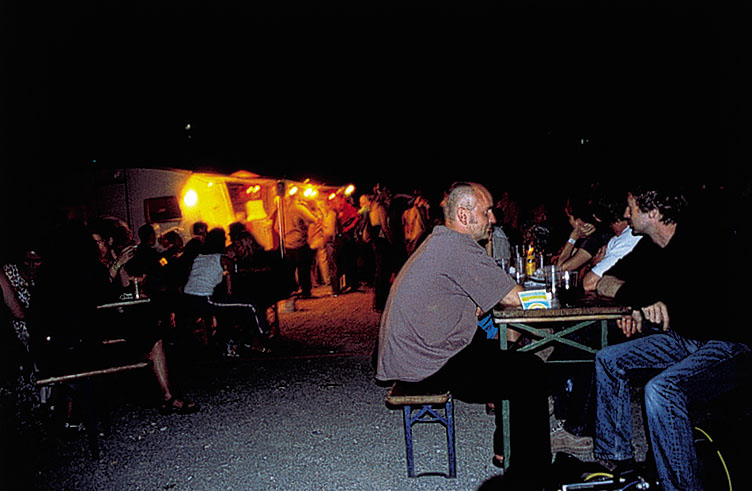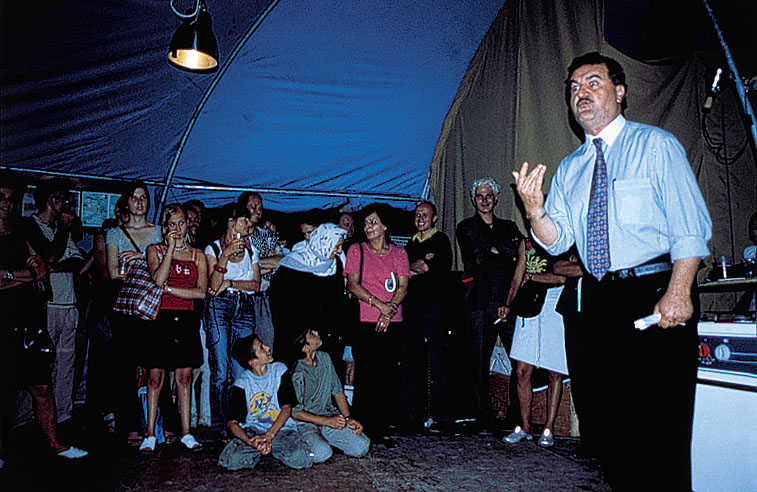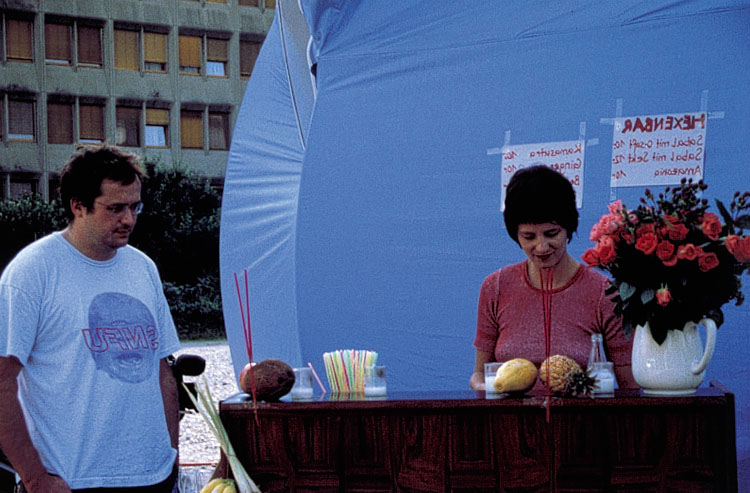Zurich , 2000
LONELINESS IN THE CITY
Creation of a space where strategies that could counteract loneliness in the city were asked for.
TRAVELLING PROJECT:
CBK DORDRECHT;
MUSEUM ABTEIBERG, MÖNCHENGLADBACH;
MACBA, BARCELONA;
KIASMA, HELSINKI;
MIGROS MUSEUM, ZURICH.
DONATED TO THE COLLECTION OF NMAC MONTENMEDIO, CÁDIZ
The theme for Zurich was Inventions against Loneliness. Proposals or strategies that could counteract loneliness in the city were asked for. On the one hand, architects, designers, and sociologists were invited, but the general public was also challenged to hand in ideas. There were 120 entries from all over the world. Strategies against loneliness were combined with new technologies and new means of communication. Participants created ‘design-weapons’ against loneliness.
Loneliness in the City is a long-term research project about loneliness in modern urban life. For a number of years this theme played an important role in the work of Alicia Framis and has been elaborated on in several different forms.
For Loneliness in the City Framis collaborated with the artist Dré Wapenaar to design a mobile platform as the a-topical place where artists, architects and the public could develop and exchange ideas. The oval-shaped pavilion or tent of approximately 12×9 metres contains five sleeping cabins for the participants; the rest of the tent is public space. The pavilion is a research laboratory where ideas are investigated and immediately tested in reality. At the same time it is a community space to meet and relax. An intensive programme of workshops, performances, special video programmes, music and interactive events was organized for each city, to tie in with local issues and participants.
From Mönchengladbach to Dordrecht, to Barcelona, Helsinki and Zurich, insight into the general causes and corners of loneliness gradually grew and alternative strategies for interaction between people in the city were devised.
The programme in Dordrecht concentrated on creating a-topical places – places that do not have a preconceived or predefined function or purpose. The workshops ended up focusing on conquering or claiming space. A public place can become private or intimate by giving it new functions or meanings; conversely, a formerly private space can become a public one.
Guests:
Franz Ackermann/artist Berlin
Lena Amuat/web designer Zurich
Thierno Bah/story teller Zurich
Fransesca Born/ping pong, fashion designer Zurich
Thomas Brusa/web designer Zurich
Dani Freitag/skim.com, designer Zurich
DJ Bastien/Zurich
DJ Belinda/Zurich
40 people/ltel-HSG St.Gallen
Alfredo Haberli/designer Zurich
Martin Heller/artist leader Expo 02 Neuchatel
Una Henry/artist Amsterdam, Ireland
Valentin Hindermann/ping pong, fashion designer Zurich
Gramazio Joergensen Kohler/architects Zurich
Thomas Jomini/architect Bern
Valerie Jomini/industrial designer Bern
Julia&Sabine/Hexenbar Zurich
DJ Karla K/Zurich
Anna Kligmann/architect ETH Zurich, Berlin
Max Kung/write Zurich
Rosa Maino/film director Zurich
Metastrat/night curator Zurich
Ralf Michel/journalist Zurich
Mouthwatering/d.j.’s and v.j.’s Bern



The theme for Zurich was Inventions against Loneliness. Proposals or strategies that could counteract loneliness in the city were asked for. On the one hand, architects, designers, and sociologists were invited, but the general public was also challenged to hand in ideas. There were 120 entries from all over the world. Strategies against loneliness were combined with new technologies and new means of communication. Participants created ‘design-weapons’ against loneliness.
Loneliness in the City is a long-term research project about loneliness in modern urban life. For a number of years this theme played an important role in the work of Alicia Framis and has been elaborated on in several different forms.
For Loneliness in the City Framis collaborated with the artist Dré Wapenaar to design a mobile platform as the a-topical place where artists, architects and the public could develop and exchange ideas. The oval-shaped pavilion or tent of approximately 12×9 metres contains five sleeping cabins for the participants; the rest of the tent is public space. The pavilion is a research laboratory where ideas are investigated and immediately tested in reality. At the same time it is a community space to meet and relax. An intensive programme of workshops, performances, special video programmes, music and interactive events was organized for each city, to tie in with local issues and participants.
From Mönchengladbach to Dordrecht, to Barcelona, Helsinki and Zurich, insight into the general causes and corners of loneliness gradually grew and alternative strategies for interaction between people in the city were devised.
The programme in Dordrecht concentrated on creating a-topical places – places that do not have a preconceived or predefined function or purpose. The workshops ended up focusing on conquering or claiming space. A public place can become private or intimate by giving it new functions or meanings; conversely, a formerly private space can become a public one.
Guests:
Franz Ackermann/artist Berlin
Lena Amuat/web designer Zurich
Thierno Bah/story teller Zurich
Fransesca Born/ping pong, fashion designer Zurich
Thomas Brusa/web designer Zurich
Dani Freitag/skim.com, designer Zurich
DJ Bastien/Zurich
DJ Belinda/Zurich
40 people/ltel-HSG St.Gallen
Alfredo Haberli/designer Zurich
Martin Heller/artist leader Expo 02 Neuchatel
Una Henry/artist Amsterdam, Ireland
Valentin Hindermann/ping pong, fashion designer Zurich
Gramazio Joergensen Kohler/architects Zurich
Thomas Jomini/architect Bern
Valerie Jomini/industrial designer Bern
Julia&Sabine/Hexenbar Zurich
DJ Karla K/Zurich
Anna Kligmann/architect ETH Zurich, Berlin
Max Kung/write Zurich
Rosa Maino/film director Zurich
Metastrat/night curator Zurich
Ralf Michel/journalist Zurich
Mouthwatering/d.j.’s and v.j.’s Bern